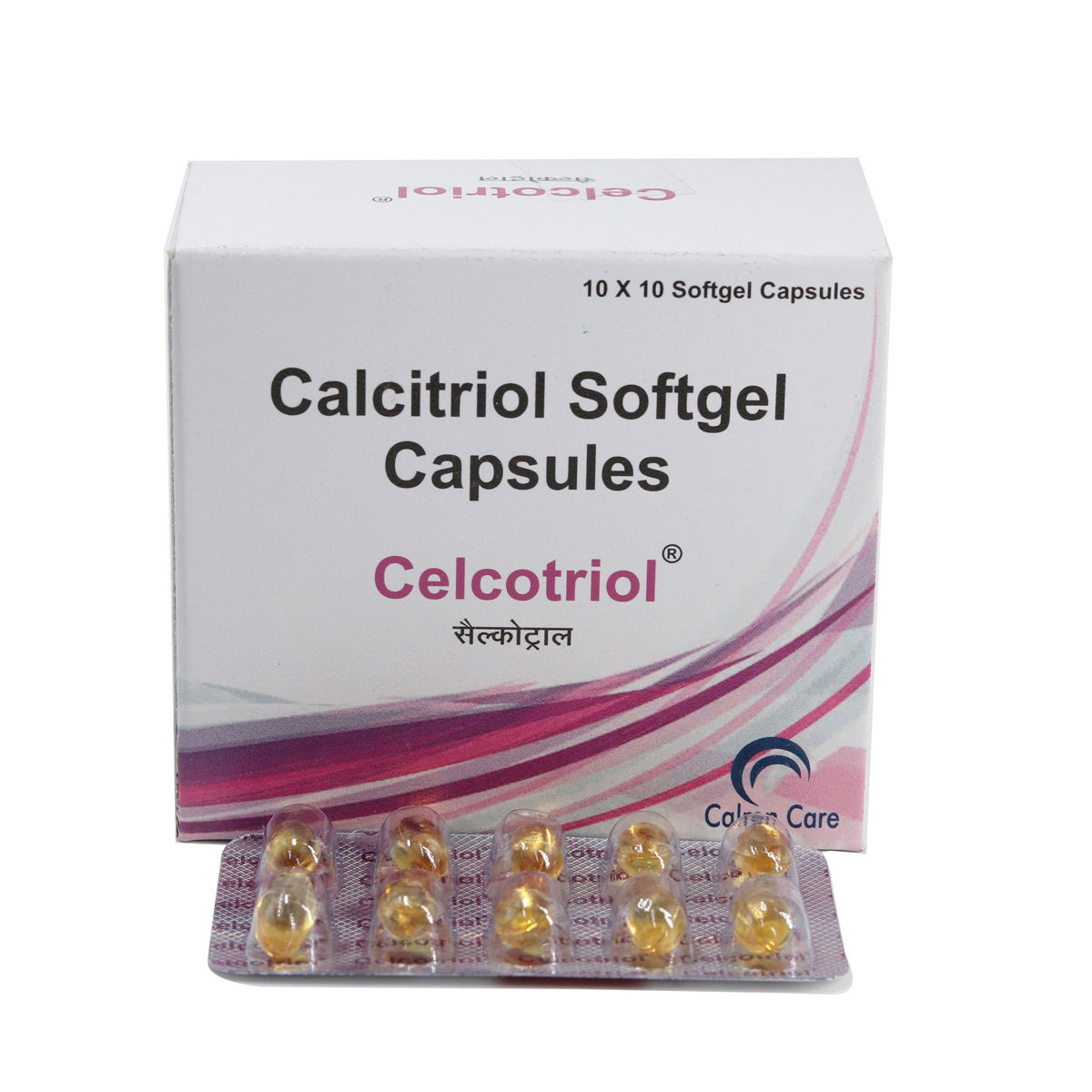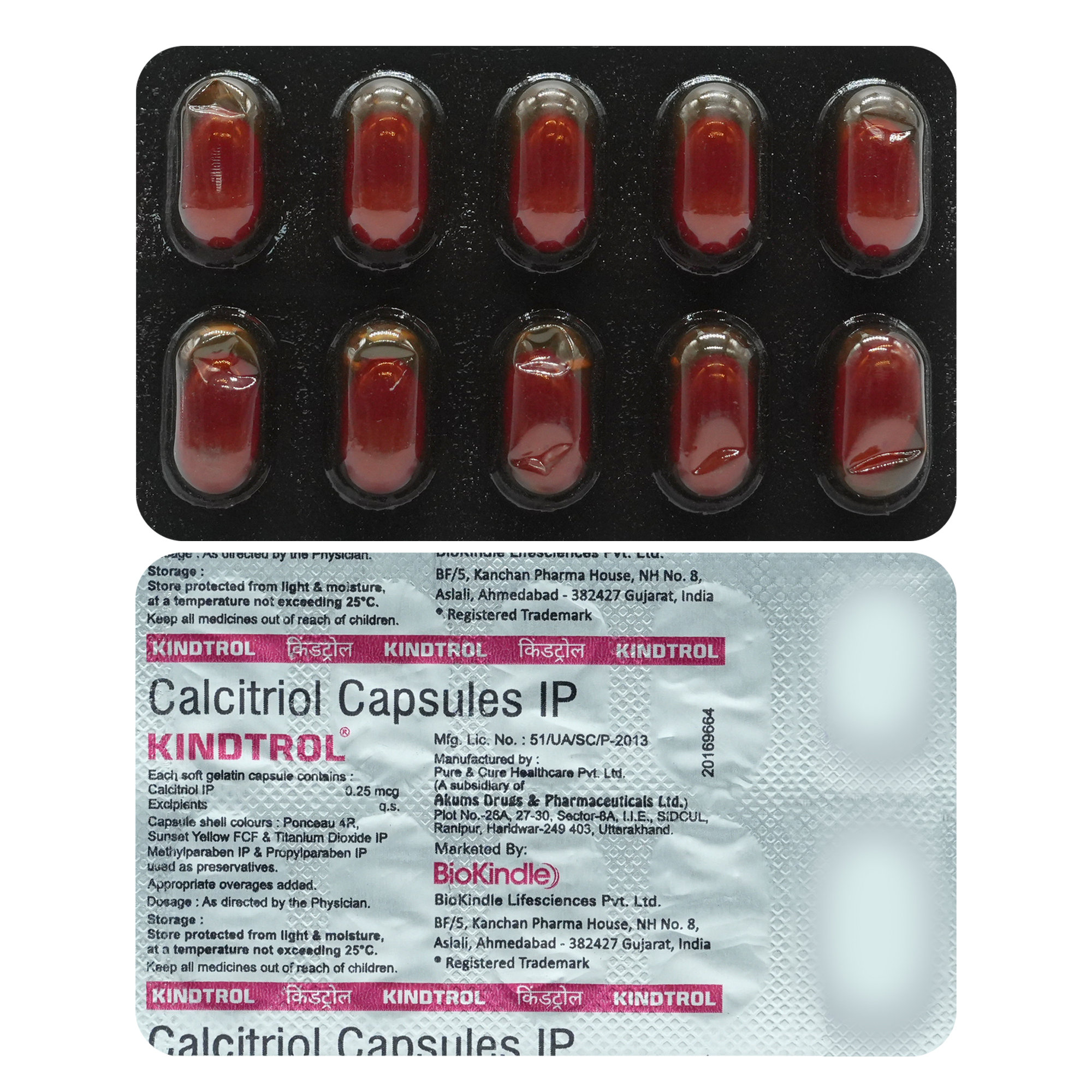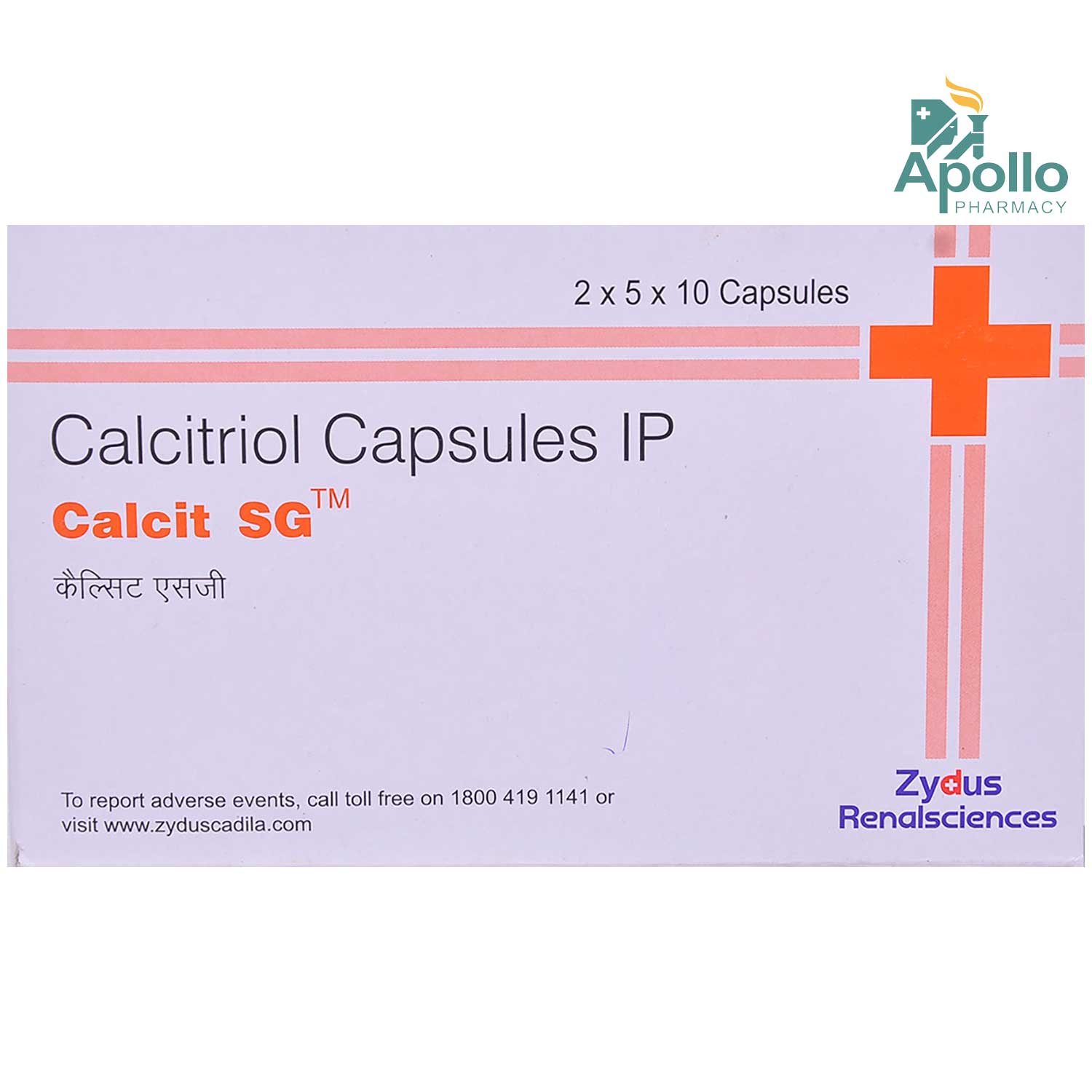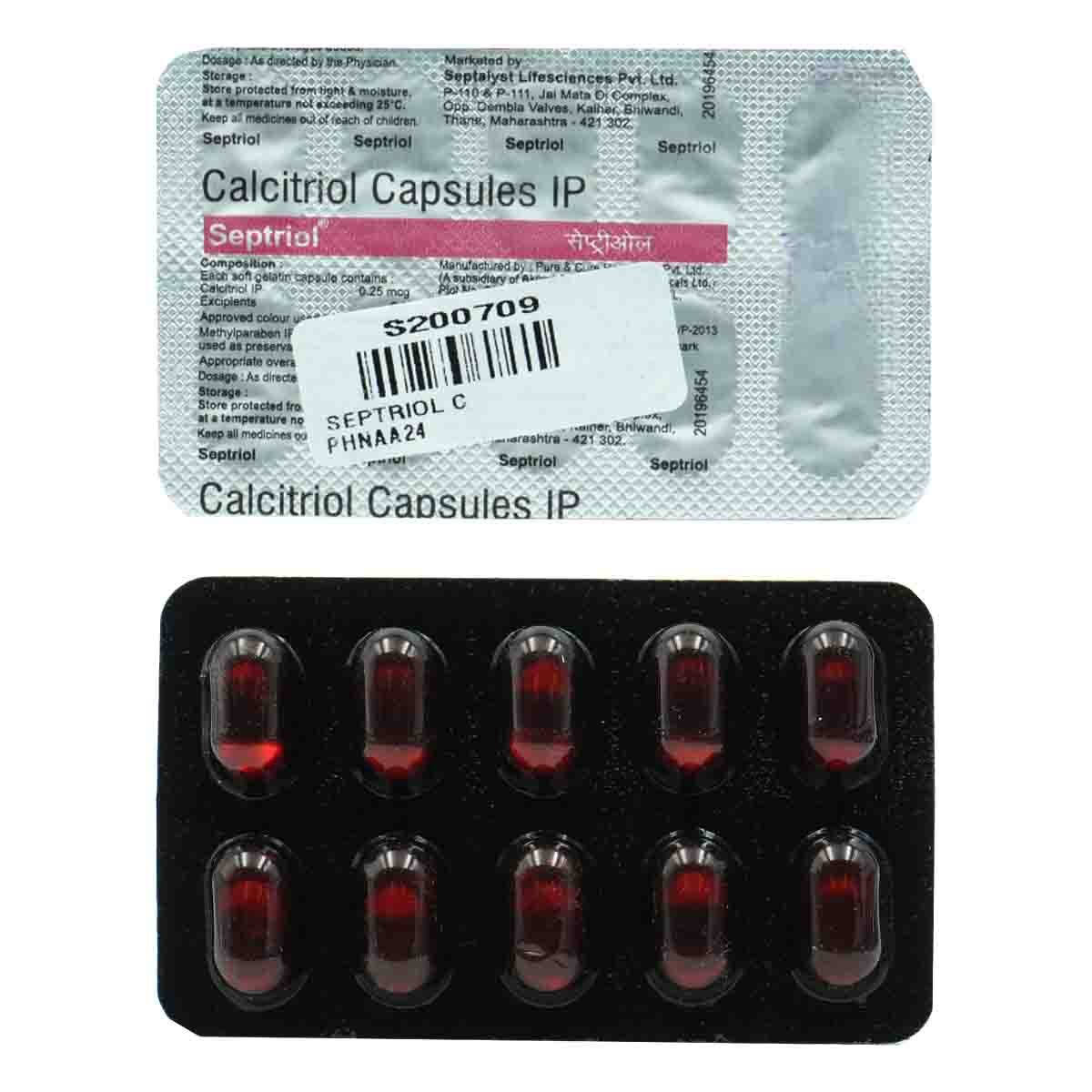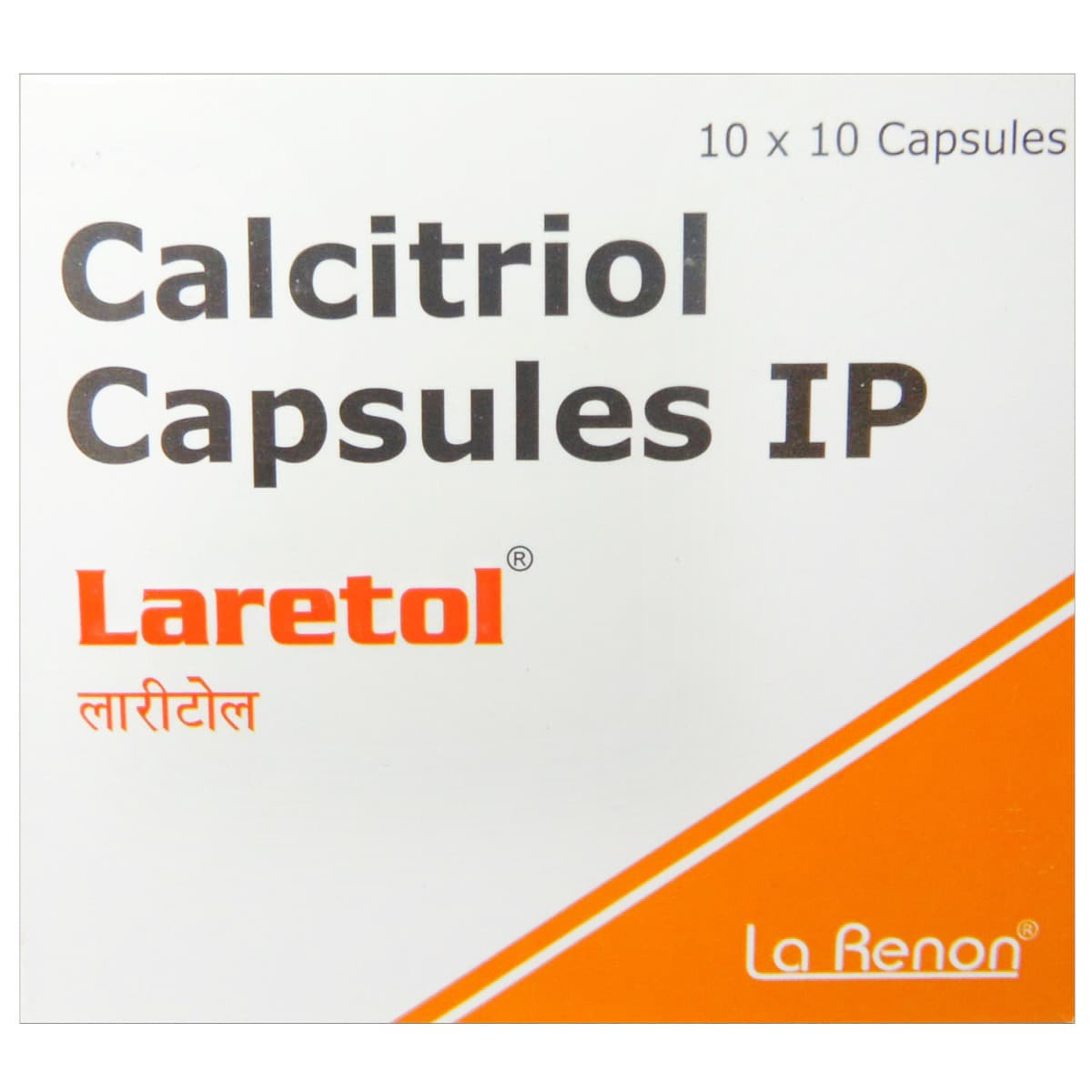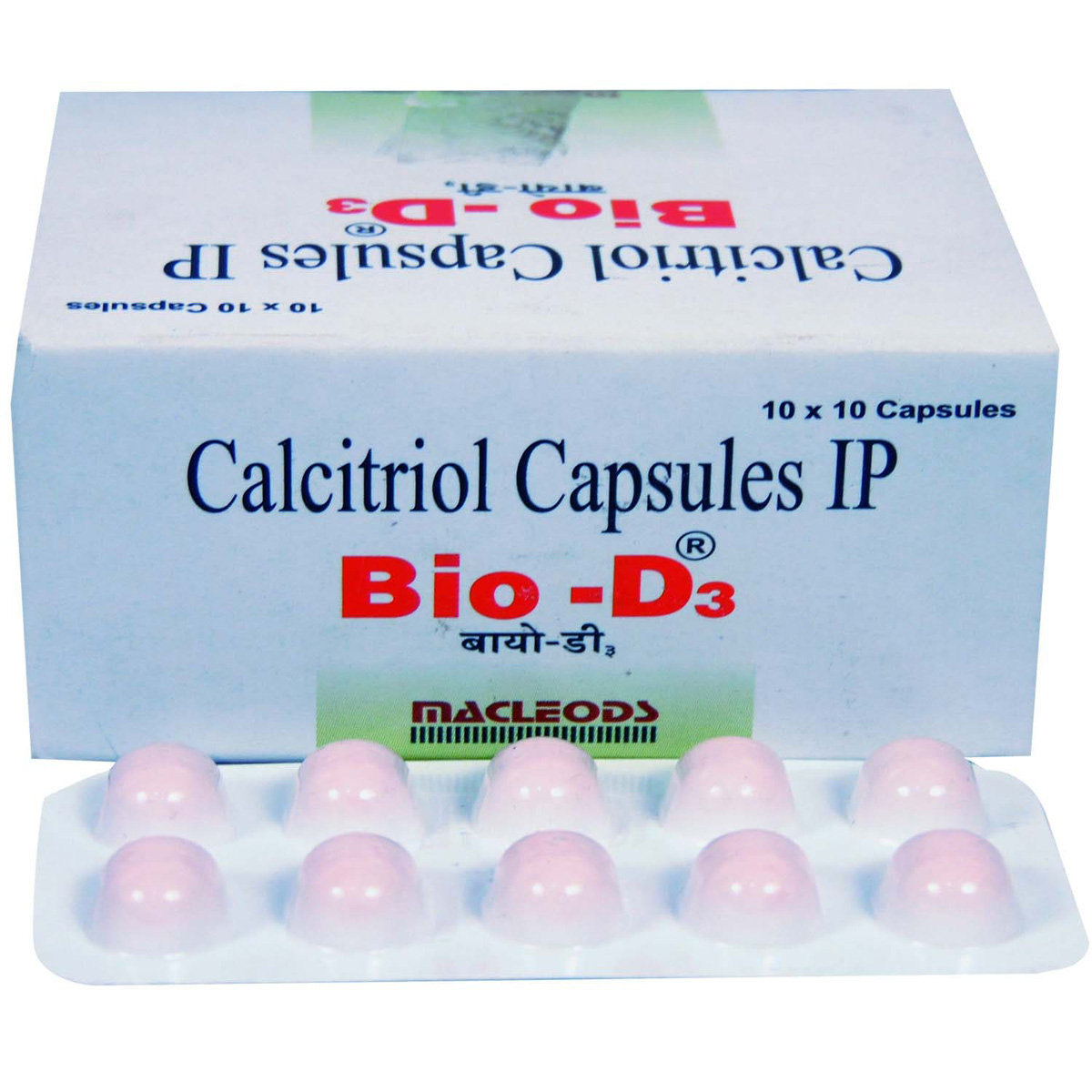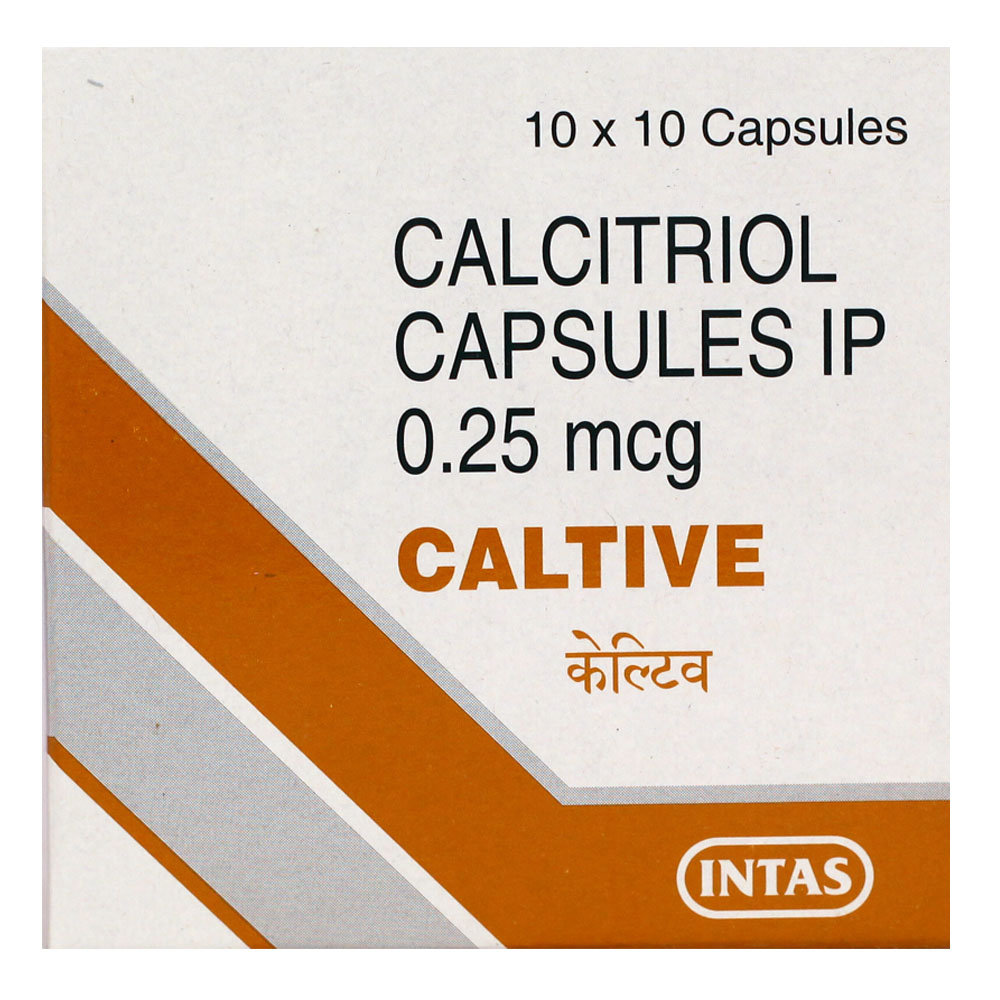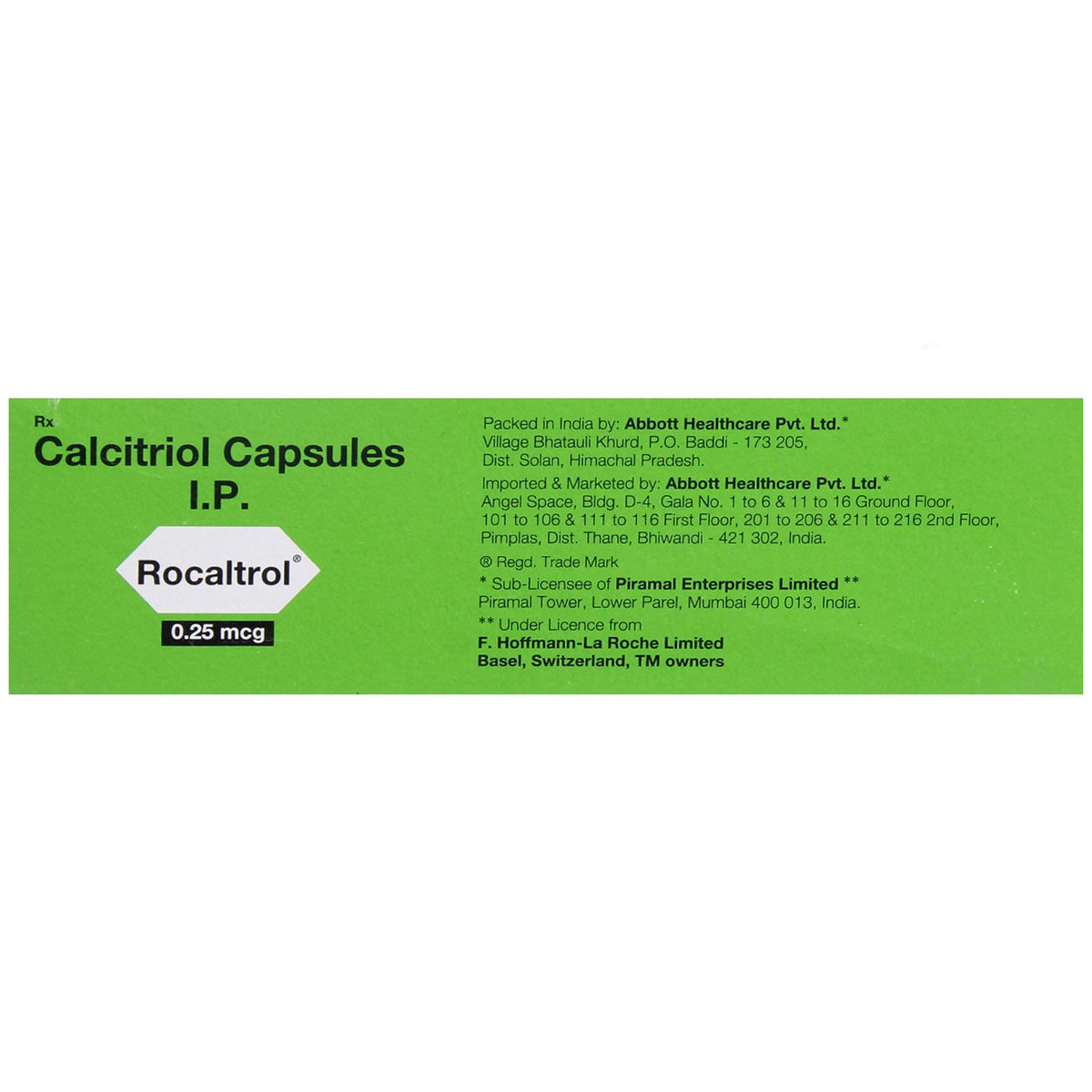Catirol 0.25 mcg Softgel Capsule 10's
MRP ₹109.5
(Inclusive of all Taxes)
₹16.4 Cashback (15%)
About Catirol 0.25 mcg Softgel Capsule
Catirol 0.25 mcg Softgel Capsule belongs to a group of medicines called ‘vitamin D metabolites’ primarily used to treat low blood calcium levels. Catirol 0.25 mcg Softgel Capsule effectively treats various conditions caused by low calcium levels in the body, such as osteoporosis (weak and brittle bones), osteomalacia/rickets (weak bones), hypoparathyroidism (low levels of parathyroid hormone), and latent tetany (a muscle disease with low blood calcium levels). Catirol 0.25 mcg Softgel Capsule can also be given to pregnant, nursing, and postmenopausal women to ensure that they are getting enough calcium. Additionally, Catirol 0.25 mcg Softgel Capsule is used to treat hyperparathyroidism (overactive parathyroid glands) and metabolic bone disease in people with chronic kidney disease, surgery, or other conditions.
Catirol 0.25 mcg Softgel Capsule contains Calcitriol (Vitamin D3); it is used to prevent or treat a calcium deficiency. It is an essential nutrient to maintain bone formation and maintenance. Calcitriol is a synthetic version of Vitamin D3 and treats calcium deficiency with hypoparathyroidism (the parathyroid gland's decreased activity) and metabolic bone diseases in people with chronic kidney failure. It raises Vitamin D levels and thereby increases calcium levels in the blood. This helps in improving the absorption rate of calcium from the intestine.
Take Catirol 0.25 mcg Softgel Capsule as prescribed by your doctor. You are advised to take Catirol 0.25 mcg Softgel Capsule for as long as your doctor has prescribed it for you, depending on your medical condition. In some cases, Catirol 0.25 mcg Softgel Capsule can cause side effects like constipation or stomach upset, nausea, vomiting, loss of appetite, mood changes, weakness, tiredness, fast or pounding heartbeat, bone/muscle pain, and headache. Most of these side effects of Catirol 0.25 mcg Softgel Capsule do not require medical attention and gradually resolve over time. However, if these side effects persist longer, please consult your doctor.
If you are known to be allergic to Catirol 0.25 mcg Softgel Capsule or its inactive components, please inform your doctor. Pregnant or breastfeeding women should consult their doctor before taking Catirol 0.25 mcg Softgel Capsule . Higher doses of Vitamin D than the recommended daily dose should be used in pregnant women only when advised by the doctor. Catirol 0.25 mcg Softgel Capsule may pass into the breast milk, hence breastfeeding mothers need to seek medical advice before starting Catirol 0.25 mcg Softgel Capsule . Do not take Catirol 0.25 mcg Softgel Capsule if you have hypercalcemia (high calcium levels), hypervitaminosis D (high vitamin D levels), and malabsorption syndrome (difficulty absorbing nutrition from food). Inform your doctor if you have any heart/kidney/liver/blood vessel diseases, kidney stones, sarcoidosis (growth of inflammatory cells in different parts of the body), Crohn's disease (inflammatory bowel disease), Whipple's disease (bacterial infection affecting joints and digestive system), achlorhydria (little or no stomach acid), low levels of bile, and phosphate imbalance.
Country of origin
Manufacturer/Marketer address
Online payment accepted

secured payment

india's most trusted pharmacy

genuine products
Composition :
Manufacturer/Marketer :
Consume Type :
Expires on or after :
Return Policy :
Provide Delivery Location
About Catirol 0.25 mcg Softgel Capsule
Catirol 0.25 mcg Softgel Capsule belongs to a group of medicines called ‘vitamin D metabolites’ primarily used to treat low blood calcium levels. Catirol 0.25 mcg Softgel Capsule effectively treats various conditions caused by low calcium levels in the body, such as osteoporosis (weak and brittle bones), osteomalacia/rickets (weak bones), hypoparathyroidism (low levels of parathyroid hormone), and latent tetany (a muscle disease with low blood calcium levels). Catirol 0.25 mcg Softgel Capsule can also be given to pregnant, nursing, and postmenopausal women to ensure that they are getting enough calcium. Additionally, Catirol 0.25 mcg Softgel Capsule is used to treat hyperparathyroidism (overactive parathyroid glands) and metabolic bone disease in people with chronic kidney disease, surgery, or other conditions.
Catirol 0.25 mcg Softgel Capsule contains Calcitriol (Vitamin D3); it is used to prevent or treat a calcium deficiency. It is an essential nutrient to maintain bone formation and maintenance. Calcitriol is a synthetic version of Vitamin D3 and treats calcium deficiency with hypoparathyroidism (the parathyroid gland's decreased activity) and metabolic bone diseases in people with chronic kidney failure. It raises Vitamin D levels and thereby increases calcium levels in the blood. This helps in improving the absorption rate of calcium from the intestine.
Take Catirol 0.25 mcg Softgel Capsule as prescribed by your doctor. You are advised to take Catirol 0.25 mcg Softgel Capsule for as long as your doctor has prescribed it for you, depending on your medical condition. In some cases, Catirol 0.25 mcg Softgel Capsule can cause side effects like constipation or stomach upset, nausea, vomiting, loss of appetite, mood changes, weakness, tiredness, fast or pounding heartbeat, bone/muscle pain, and headache. Most of these side effects of Catirol 0.25 mcg Softgel Capsule do not require medical attention and gradually resolve over time. However, if these side effects persist longer, please consult your doctor.
If you are known to be allergic to Catirol 0.25 mcg Softgel Capsule or its inactive components, please inform your doctor. Pregnant or breastfeeding women should consult their doctor before taking Catirol 0.25 mcg Softgel Capsule . Higher doses of Vitamin D than the recommended daily dose should be used in pregnant women only when advised by the doctor. Catirol 0.25 mcg Softgel Capsule may pass into the breast milk, hence breastfeeding mothers need to seek medical advice before starting Catirol 0.25 mcg Softgel Capsule . Do not take Catirol 0.25 mcg Softgel Capsule if you have hypercalcemia (high calcium levels), hypervitaminosis D (high vitamin D levels), and malabsorption syndrome (difficulty absorbing nutrition from food). Inform your doctor if you have any heart/kidney/liver/blood vessel diseases, kidney stones, sarcoidosis (growth of inflammatory cells in different parts of the body), Crohn's disease (inflammatory bowel disease), Whipple's disease (bacterial infection affecting joints and digestive system), achlorhydria (little or no stomach acid), low levels of bile, and phosphate imbalance.
Uses of Catirol 0.25 mcg Softgel Capsule
Key Benefits
Catirol 0.25 mcg Softgel Capsule effectively treats various conditions caused by low calcium levels in the body, such as osteoporosis (weak and brittle bones), osteomalacia/rickets (weak bones), hypoparathyroidism (low levels of parathyroid hormone), and latent tetany (a muscle disease with low blood calcium levels). Catirol 0.25 mcg Softgel Capsule can also be given to pregnant, nursing, and postmenopausal women to ensure that they are getting enough calcium. Additionally, Catirol 0.25 mcg Softgel Capsule is used to treat hyperparathyroidism (overactive parathyroid glands) and metabolic bone disease in people with chronic kidney disease, surgery, or other conditions.
Directions for Use
Storage
Side Effects of Catirol 0.25 mcg Softgel Capsule
- Hypercalcaemia (high calcium levels in the blood)
- Loss of appetite
- Weight loss
- Feeling sick
- Being sick
- Headache and feeling sluggish
- Drowsy or weak
- Stomach pain or discomfort
- Urinary tract infection
- Rash
Drug Warnings
Before taking Catirol 0.25 mcg Softgel Capsule , inform your doctor if you are undergoing hemodialysis due to kidney problems and have a stent in the heart. Catirol 0.25 mcg Softgel Capsule may alter calcium levels, so it is recommended to regularly monitor calcium levels in the blood and urine. Inform your doctor immediately if you notice fever, increased thirst and urination, dehydration, bedwetting, constipation, and stomach pain, as they may sign very high levels of calcium in your blood. Pregnant or breastfeeding women should consult their doctor before taking Catirol 0.25 mcg Softgel Capsule . Higher doses of Vitamin D than the recommended daily dose should be used in pregnant women only when advised by the doctor. Catirol 0.25 mcg Softgel Capsule may pass into the breast milk, hence breastfeeding mothers need to seek medical advice before starting Catirol 0.25 mcg Softgel Capsule . Do not take Catirol 0.25 mcg Softgel Capsule if you have hypercalcemia (high calcium levels), hypervitaminosis D (high vitamin D levels), and malabsorption syndrome (difficulty absorbing nutrition from food).
Drug Interactions
Drug-Drug interactions: Catirol 0.25 mcg Softgel Capsule may interact with other medicines containing vitamin D, Steroid medicines (hydrocortisone, prednisolone, dexamethasone), a medicine used to treat high levels of cholesterol in your blood (cholestyramine), medications containing magnesium, such as antacids (used to treat indigestion), medicines used to treat heart disease (digoxin or digitoxin), and diuretic medicines (bendroflumethiazide, chlortalidone, indapamide)
Drug-Food interactions: Do not take foods enriched with vitamin D and avoid a high intake of dairy products such as milk, ghee, and cheese.
Drug-Disease interactions: Catirol 0.25 mcg Softgel Capsule is not recommended for use in patients with bleeding disorders, hypercalcemia (high levels of calcium in the blood), metastatic calcification (extra deposits of calcium in the body), kidney problems, high blood pressure, cancer, optic nerve damage, and high levels of vitamin D.
Drug-Drug Interactions Checker List
- HYDROCORTISONE
- PREDNISOLONE
- CHOLESTYRAMINE
- DIGOXIN
- DIGITOXIN
- BENDROFLUMETHIAZIDE
- CHLORTALIDONE
- INDAPAMIDE
Habit Forming
Diet & Lifestyle Advise
- Include dairy products like milk, yoghurt, cheese, or milk-based custard in your diet.
- Eat a serving of broccoli, cabbage, bok choy, spinach, and other green leafy vegetables daily.
- Snack on calcium-rich nuts like Brazil nuts or almonds.
- Sprinkle sesame seeds over your food, vegetables, and salads. Sesame seeds are high in calcium.
- Avoid or reduce the intake of caffeine, soft drinks, and alcohol that inhibit calcium absorption.
- Replace the meat with tofu or tempeh for extra calcium in your food.
Special Advise
- Catirol 0.25 mcg Softgel Capsule is not indicated in patients with or with a history of kidney stones, as it may increase the chance of kidney stone formation. Consult your doctor for further advice.
- Your doctor may advise regular monitoring of calcium levels.
Disease/Condition Glossary
Osteoporosis: Osteoporosis is a bone disease that weakens and brittle bones by decreasing bone density. As bones become less dense, they weaken and are more likely to break. Breaking a bone is a serious complication of osteoporosis, especially with older patients. Women are much more likely to develop osteoporosis than are men. Signs and symptoms include back pain caused by a fractured or collapsed vertebra, loss of height over time, a stooped posture, a bone that breaks much more quickly than expected.
Osteomalacia/Rickets: A bone disease caused by softening and weakening bones in children due to inadequate vitamin D. Adults can experience a similar condition known as osteomalacia. It causes bone pain, poor growth, and soft, weak bones that can lead to bone deformities.
Tetany: A disease condition due to low calcium levels (hypocalcemia) in the body causes cramps and spasms in the hands, feet, and larynx (voice box).
FAQs
Catirol 0.25 mcg Softgel Capsule contains calcitriol, and it works by making your body absorb more calcium from your diet. This helps to form healthy bones and reduce bone damage.
Catirol 0.25 mcg Softgel Capsule can cause kidney stones due to excess calcium deposition when used for a prolonged period. Please consult your doctor before taking Catirol 0.25 mcg Softgel Capsule as a daily supplement if you have any kidney problems or a history of kidney stones.
Catirol 0.25 mcg Softgel Capsule is used to increase low levels of calcium in the body. Hence it is not advised to use Catirol 0.25 mcg Softgel Capsule during hypercalcemia since it causes the overdose of calcium leading to kidney stones and other effects.
Preferably, supplements of vitamin D3 should be taken along with the day's main meal or with milk.
Do not use Catirol 0.25 mcg Softgel Capsule if you ate allergic to Catirol 0.25 mcg Softgel Capsule or any other ingredients in it. Catirol 0.25 mcg Softgel Capsule is not recommended in hypercalcemia (high calcium levels), metastatic calcification (extra deposits of calcium in the body), hypervitaminosis D (high vitamin D levels), and malabsorption syndrome (difficulty absorbing nutrition from food).
Disclaimer
Alcohol
Safe if prescribed
Drinking alcohol can affect calcium absorption, hence it is advised to limit the alcohol intake while using Catirol 0.25 mcg Softgel Capsule .
Pregnancy
Consult your doctor
During pregnancy, use higher doses of Catirol 0.25 mcg Softgel Capsule than the daily dietary allowance only when advised by the doctor. Calcitriol in higher doses may harm the fetus. Your doctor will weigh the potential risks and benefits before prescribing Catirol 0.25 mcg Softgel Capsule .
Breast Feeding
Consult your doctor
Consult your doctor before taking Catirol 0.25 mcg Softgel Capsule if you are breastfeeding. Catirol 0.25 mcg Softgel Capsule can pass into the breast milk. If Catirol 0.25 mcg Softgel Capsule is used during breastfeeding, please monitor the mother and the infant's serum calcium levels.
Driving
Safe if prescribed
Catirol 0.25 mcg Softgel Capsule may not affect your ability to drive.
Liver
Consult your doctor
Let your doctor know if you have any history of liver diseases before taking Catirol 0.25 mcg Softgel Capsule . Hepatic impairment/liver disease can alter the metabolic and therapeutic activity of certain Vitamin D forms.
Kidney
Consult your doctor
It is advised to seek doctor advice before starting Catirol 0.25 mcg Softgel Capsule if you have kidney diseases like kidney stones or undergoing dialysis. Calcitriol in Catirol 0.25 mcg Softgel Capsule increases inorganic phosphate levels in serum, hence caution should be taken in patients undergoing dialysis to maintain adequate phosphorus levels and avoid ectopic calcification (calcium deposition).
Children
Safe if prescribed
Catirol 0.25 mcg Softgel Capsule should be used with caution in children and only if prescribed by a doctor.
Author Details
We provide you with authentic, trustworthy and relevant information
Uses of Catirol 0.25 mcg Softgel Capsule
Key Benefits
Catirol 0.25 mcg Softgel Capsule effectively treats various conditions caused by low calcium levels in the body, such as osteoporosis (weak and brittle bones), osteomalacia/rickets (weak bones), hypoparathyroidism (low levels of parathyroid hormone), and latent tetany (a muscle disease with low blood calcium levels). Catirol 0.25 mcg Softgel Capsule can also be given to pregnant, nursing, and postmenopausal women to ensure that they are getting enough calcium. Additionally, Catirol 0.25 mcg Softgel Capsule is used to treat hyperparathyroidism (overactive parathyroid glands) and metabolic bone disease in people with chronic kidney disease, surgery, or other conditions.
- Stay hydrated by drinking plenty of water.
- Avoid dairy product such as cheese, milk, yogurt and ice cream.
- Maintain healthy weight and exercise daily.
- Following a low-calcium diet can help reduce hypercalcemia symptoms.
- Inform your doctor about the medication you're taking and the UTI symptoms you're experiencing.
- Your doctor may adjust your medication regimen or consider alternative medications or dosages that may reduce the risk of UTIs.
- Drink plenty of water (at least 8-10 glasses a day) to help flush out bacteria. Avoid sugary drinks and caffeine, which can exacerbate UTI symptoms.
- Urinate when you feel the need rather than holding it in. This can help prevent bacterial growth and reduce the risk of UTIs.
- Consider cranberry supplements: Cranberry supplements may help prevent UTIs by preventing bacterial adhesion.
- Monitor UTI symptoms and report any changes to your doctor.
- If antibiotics are prescribed, take them as directed and complete the full course.
- Reduce sodium intake to minimize calcium excretion in urine.
- Limit animal protein consumption to decrease urinary calcium levels.
- Increase fluid intake by drinking plenty of water to dilute urine.
- Moderate calcium intake based on individual needs, avoiding drastic restriction.
- Limit oxalate-rich foods like spinach and chocolate to minimize kidney stone formation.
- Stay hydrated by drinking plenty of water.
- Consider reducing vitamin D supplementation if excessive intake is contributing to hypercalciuria.
- Regularly monitor urine calcium levels through 24-hour urine tests.
- Always seek guidance from a healthcare expert prior to implementing substantial changes to your diet or lifestyle routine.
- Drink water or other clear fluids.
- To prevent worsening of pain, limit intake of tea, coffee, or alcohol.
- Include bland foods like rice, toast, crackers, and rice in your diet.
- Avoid lying down immediately after eating as it may cause indigestion or heartburn.
- Avoid acidic and spicy food as it may cause indigestion.
Directions for Use
Storage
Drug Warnings
Before taking Catirol 0.25 mcg Softgel Capsule , inform your doctor if you are undergoing hemodialysis due to kidney problems and have a stent in the heart. Catirol 0.25 mcg Softgel Capsule may alter calcium levels, so it is recommended to regularly monitor calcium levels in the blood and urine. Inform your doctor immediately if you notice fever, increased thirst and urination, dehydration, bedwetting, constipation, and stomach pain, as they may sign very high levels of calcium in your blood. Pregnant or breastfeeding women should consult their doctor before taking Catirol 0.25 mcg Softgel Capsule . Higher doses of Vitamin D than the recommended daily dose should be used in pregnant women only when advised by the doctor. Catirol 0.25 mcg Softgel Capsule may pass into the breast milk, hence breastfeeding mothers need to seek medical advice before starting Catirol 0.25 mcg Softgel Capsule . Do not take Catirol 0.25 mcg Softgel Capsule if you have hypercalcemia (high calcium levels), hypervitaminosis D (high vitamin D levels), and malabsorption syndrome (difficulty absorbing nutrition from food).
Therapeutic Class
Drug-Drug Interactions
Drug-Drug Interactions
Login/Sign Up
Co-administration of Catirol 0.25 mcg Softgel Capsule with Dihydrotachysterol can increase the risk of adverse effects.
How to manage the interaction:
Co-administration of Dihydrotachysterol with Catirol 0.25 mcg Softgel Capsule can possibly result in an interaction, but it can be taken if your doctor has advised it. If you notice any of these symptoms - irregular heartbeat, seizures, weakness, tiredness, headache, dizziness, ringing in the ears, loss of appetite, feeling sick, throwing up, constipation, dry mouth, strange taste in your mouth, muscle or bone pain, trouble coordinating movements, weak muscles, peeing a lot, feeling very thirsty, losing weight, eye infection, sensitivity to light, itching, or a higher body temperature - make sure to call a doctor right away. Do not discontinue any medications without consulting a doctor.
Co-administration of Catirol 0.25 mcg Softgel Capsule with Digitoxin may increase the risk or severity of digitoxin toxicity and irregular heart rhythm.
How to manage the interaction:
Although there is an interaction, Catirol 0.25 mcg Softgel Capsule can be taken with Digitoxin if prescribed by the doctor. Consult the prescriber if you experience symptoms that could indicate high blood calcium, such as weakness, fatigue, headache, dizziness, drowsiness, ringing in the ears, loss of appetite, nausea, vomiting, constipation, dry mouth, a metallic taste in the mouth, bone or muscle pain, incoordination, frequent urination, and weight loss. Also, seek medical attention if you experience symptoms of digitoxin toxicity, such as blurred vision, slow pulse, or irregular heartbeats. Do not discontinue the medication without consulting a doctor.
Co-administration of Paricalcitol and Catirol 0.25 mcg Softgel Capsule are forms of vitamin D, and taking too much vitamin D may lead to toxic effects related to excessive calcium levels in the blood and urine.
How to manage the interaction:
Concomitant use of Paricalcitol with Catirol 0.25 mcg Softgel Capsule can lead to an interaction, it can be taken if advised by a doctor. Consult the prescriber if you experience symptoms of vitamin D intoxication such as weakness, fatigue, headache, vertigo, drowsiness, ringing in the ears, loss of appetite, nausea, vomiting, constipation, dry mouth, metallic taste, muscle pain, bone pain, muscle incoordination, and low muscle tone. Do not discontinue the medication without consulting a doctor.
Co-administration of Isoniazid with Catirol 0.25 mcg Softgel Capsule may decrease the effects of Catirol 0.25 mcg Softgel Capsule.
How to manage the interaction:
Although there is an interaction, Catirol 0.25 mcg Softgel Capsule can be taken with isoniazid if prescribed by the doctor. Do not stop using any medications without talking to a doctor. Do not discontinue the medication without consulting a doctor.
Co-administration of Metolazone with Catirol 0.25 mcg Softgel Capsule can cause blood calcium levels to become too high.
How to manage the interaction:
Although there is an interaction, Catirol 0.25 mcg Softgel Capsule can be taken with metolazone if prescribed by the doctor. Consult the doctor if you experience symptoms such as dizziness, drowsiness, weakness, lethargy, headache, nausea, vomiting, or seizures. Do not discontinue the medication without consulting a doctor.
Co-administration of Rifapentine with Catirol 0.25 mcg Softgel Capsule may decrease the effects of Catirol 0.25 mcg Softgel Capsule.
How to manage the interaction:
Although there is an interaction, Catirol 0.25 mcg Softgel Capsule can be taken with Rifapentine if prescribed by the doctor. The doctor may recommend dose adjustment or special tests to use both medicines safely. Do not discontinue the medication without consulting a doctor.
Co-administration of Catirol 0.25 mcg Softgel Capsule and Burosumab may cause increases in phosphorus and vitamin D levels in the blood, which may lead to an increased risk of kidney stones.
How to manage the interaction:
There may be a possibility of interaction between Catirol 0.25 mcg Softgel Capsule and Burosumab, but it can be taken if prescribed by a doctor. If you have any of these symptoms like kidney stones, it's important to contact a doctor right away. Do not stop using any medications without a doctor's advice. Do not discontinue the medication without consulting a doctor.
Co-administration of Catirol 0.25 mcg Softgel Capsule with Carbamazepine may decrease the effects of Catirol 0.25 mcg Softgel Capsule.
How to manage the interaction:
Although there is an interaction, Catirol 0.25 mcg Softgel Capsule can be taken with Carbamazepine if prescribed by the doctor. However, if you experience any unusual symptoms contact your doctor immediately. Do not stop using any medications without first talking to your doctor.
Co-administration of Amobarbital and Catirol 0.25 mcg Softgel Capsule may decrease the effects of Catirol 0.25 mcg Softgel Capsule.
How to manage the interaction:
Co-administration of Catirol 0.25 mcg Softgel Capsule with Amobarbital can possibly result in an interaction, but it can be taken if a doctor has advised it. If you notice any of these symptoms, it's important to contact a doctor right away. Do not stop using any medications without talking to a doctor.
Co-administration of Cholecalciferol and Catirol 0.25 mcg Softgel Capsule are forms of vitamin D, and taking too much vitamin D may lead to toxic effects.
How to manage the interaction:
Although there is a possible interaction between colecalciferol and Catirol 0.25 mcg Softgel Capsule, you can take these medicines together if prescribed by your doctor. If you notice any of these symptoms - irregular heartbeat, seizures, weakness, tiredness, headache, dizziness, ringing in the ears, loss of appetite, feeling sick, dry mouth, strange taste in your mouth, muscle or bone pain, thirst, losing weight, eye infection, sensitivity to light, runny nose or itching - contact a doctor right away. Do not discontinue any medications without consulting a doctor.
Drug-Drug Interactions Checker List
- HYDROCORTISONE
- PREDNISOLONE
- CHOLESTYRAMINE
- DIGOXIN
- DIGITOXIN
- BENDROFLUMETHIAZIDE
- CHLORTALIDONE
- INDAPAMIDE
Diet & Lifestyle Advise
- Include dairy products like milk, yoghurt, cheese, or milk-based custard in your diet.
- Eat a serving of broccoli, cabbage, bok choy, spinach, and other green leafy vegetables daily.
- Snack on calcium-rich nuts like Brazil nuts or almonds.
- Sprinkle sesame seeds over your food, vegetables, and salads. Sesame seeds are high in calcium.
- Avoid or reduce the intake of caffeine, soft drinks, and alcohol that inhibit calcium absorption.
- Replace the meat with tofu or tempeh for extra calcium in your food.
Habit Forming
Side Effects of Catirol 0.25 mcg Softgel Capsule
- Hypercalcaemia (high calcium levels in the blood)
- Loss of appetite
- Weight loss
- Feeling sick
- Being sick
- Headache and feeling sluggish
- Drowsy or weak
- Stomach pain or discomfort
- Urinary tract infection
- Rash
Special Advise
- Catirol 0.25 mcg Softgel Capsule is not indicated in patients with or with a history of kidney stones, as it may increase the chance of kidney stone formation. Consult your doctor for further advice.
- Your doctor may advise regular monitoring of calcium levels.
Disease/Condition Glossary
Osteoporosis: Osteoporosis is a bone disease that weakens and brittle bones by decreasing bone density. As bones become less dense, they weaken and are more likely to break. Breaking a bone is a serious complication of osteoporosis, especially with older patients. Women are much more likely to develop osteoporosis than are men. Signs and symptoms include back pain caused by a fractured or collapsed vertebra, loss of height over time, a stooped posture, a bone that breaks much more quickly than expected.
Osteomalacia/Rickets: A bone disease caused by softening and weakening bones in children due to inadequate vitamin D. Adults can experience a similar condition known as osteomalacia. It causes bone pain, poor growth, and soft, weak bones that can lead to bone deformities.
Tetany: A disease condition due to low calcium levels (hypocalcemia) in the body causes cramps and spasms in the hands, feet, and larynx (voice box).
All Substitutes & Brand Comparisons
RX
Bonami Capsule 10's
Rene Lifescience
₹84
(₹7.56 per unit)
23% CHEAPERRX
Celcotriol Capsule 10's
Calren Care Lifesciences Pvt Ltd
₹91.5
(₹8.24 per unit)
16% CHEAPERRX
Kindtrol Capsule 10's
Deccan Healthcare
₹97.5
(₹8.78 per unit)
10% CHEAPER

Have a query?














